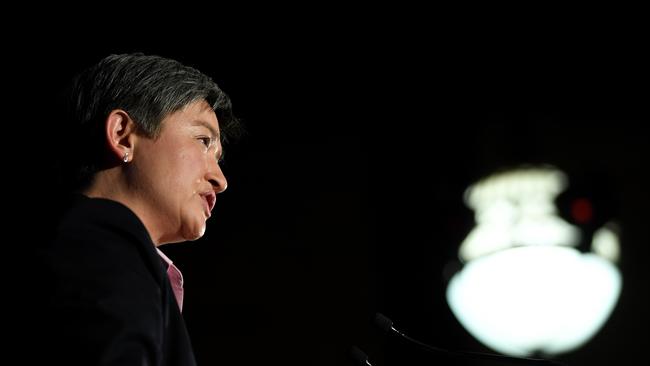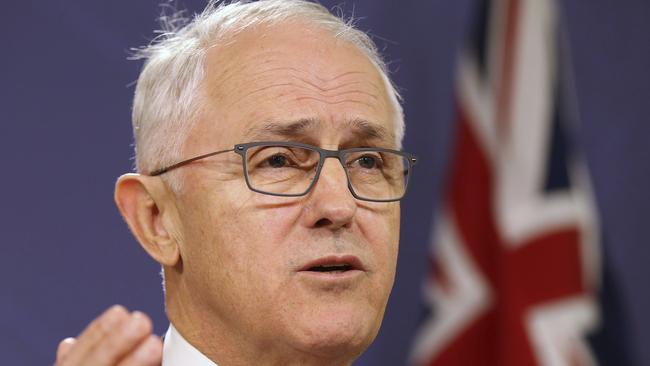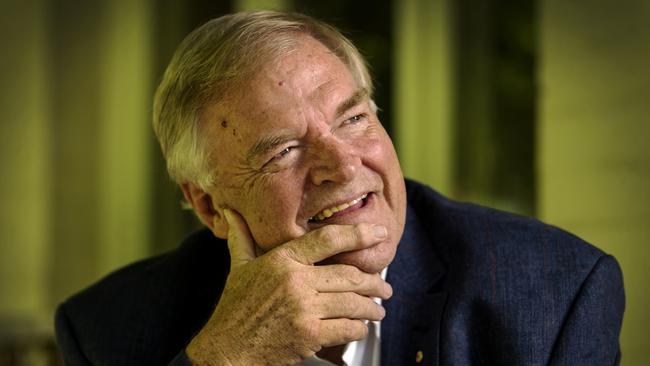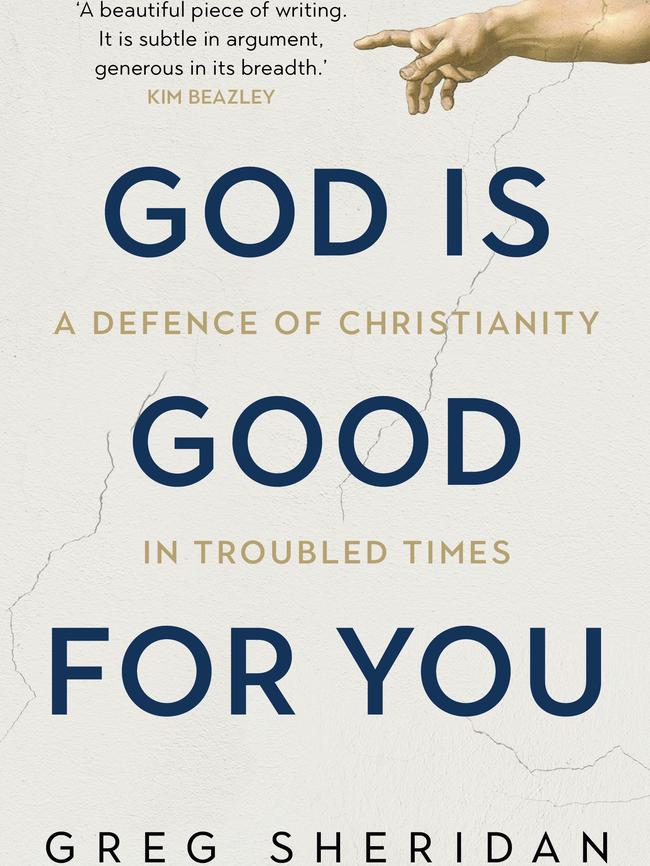Politicians reveal what religion means to them
As a teenager, Andrew Hastie challenged his parents’ religious beliefs. But in the worst moment of his life, they saved him.

When Andrew Hastie went to Afghanistan on combat service with the SAS he wrote a letter to his wife, Ruth, the envelope sealed with wax, to be opened by her only in the event of his death.
He left the letter with a friend, who was to be part of the notification team, the small group that would go and see Hastie’s wife if the worst happened.
The West Australian Liberal MP’s parents have deep religious beliefs. Hastie rebelled against his dad’s beliefs for a while: “Around age 16 to 19 I was very aggressively challenging a lot of what I was taught. The question for me was: can I still be a good person without God? I had embraced the postmodern view I got at school — that I was a consumer and I could make any choices I liked. Partly I wanted to justify under-age drinking and having a good time.”
In 2000 his father took him to Biola University, an evangelical Christian university in California. On that trip he met Chuck Colson, the Nixon staffer who went to jail for his Watergate crimes, found God there and later got heavily involved in the Christian mission to prisoners in jail. Hastie also read a book about Christian belief: “The author started off with the empty self, describing narcissistic, modern man, and I felt he was describing me. That led me to ask the question, did I accept the basic tenets of Christianity? The next question was: how do I practise Christianity? What implications does it have for my weekends, boozing and trying to sleep with as many girls as possible?”
In one tragic incident in Afghanistan, Hastie called in American helicopter support to fire on two Taliban fighters who were planning to attack Hastie’s soldiers and the Afghan base they were visiting when the helicopters came to pick them up. Hastie knew this because the Taliban signals had been intercepted.
In the worst moment of Hastie’s life, the helicopters shot the wrong Afghans, killing two little boys, brothers aged six and seven. Hastie took control of his own emotional state, took a few soldiers with him to go out to where the boys had been shot and see if they were still alive and if there was any chance of saving them, then reported everything back to his bosses. He didn’t eat or sleep for the next 24 hours and for a long time had nightmares about it. The boys are still regularly in his mind.
Later, he pushed to be allowed to go and talk to the boys’ family: “It was about telling the truth and taking responsibility. I wanted to apologise to the boys’ uncle. The uncle was about 45 or 50, with a grey, weather-beaten face. He had assumed the role of defender of the family. The 16-year-old brother, you could see the anger on his face. The uncle acknowledged the approach and said: ‘You’re forgiven.’ For me, this prefigured divine forgiveness.”
This tragedy didn’t shake Hastie’s Christian faith: “Imagine if you weren’t a Christian, if you were a closed universe atheist, how bleak and senseless those deaths would be.”
‘I think of religion as a mystery. Just as poetry is that which cannot be translated, faith is in many ways that which cannot be explained’
— Malcolm Turnbull
-

Penny Wong
I catch up with senator Penny Wong for a discussion in the comprehensively anonymous offices made available to federal politicians when they visit Melbourne. It is the only discussion I’ve had with her where she seemed a fraction hesitant or nervous. I feel a bit like a dentist, inflicting pain for a (hopefully) greater good.
She says: “I don’t think faith for me is an intellectual exercise. It’s a much more instinctive, intuitive proposition. It’s hard to talk about, isn’t it? The way I like to approach politics, I like to be very rational and factually based and well prepared and talk about things in logical sequences, and I don’t think I’ve ever felt about faith that way.”
Faith is certainly not irrational, however: “The important decisions in our lives we make with reference to what we work with intellectually as much as we can, but they’re generally made emotionally and spiritually …
“It’s a very diverse religion, Christianity. Perhaps I have a certain view because I was born in Sabah (Malaysia). Growing up in a multi-faith society was important. I had friends who were Muslims, family members who were Buddhist as well as those who were Christian. I never had the sense that this (Christianity) is the only way. I always felt there were many paths to God. This was the kind of path that resonated with me.
“When times have been hard, at different times of my life, when I’ve felt alone or lonely, faith has been important to me. There are also moments of joy when you can feel faith or feel grace. You’re with your family and you feel blessed. It’s good to be thankful.” And prayer? “Yes (I do pray). I’m less at church than I used to be. I used to go to Sunday morning communion more often. You pray at different moments, moments when you’re quiet. I have to have moments when I find a bit of calm in my life. If I don’t, I don’t perform … I don’t think of God as a power to go to with a shopping list. I think more of asking for the patience or courage to cope. For me, it’s more asking that he walk with me.
“If I’m with my father and his side of the family, prayer is a much more explicit side of their life. He’ll say grace and give thanks for the family. I do find being in church incredibly moving.”
And what does Wong believe happens when we die? “I don’t know. I don’t believe we just end.”
-

Malcolm Turnbull
I was fascinated a few years back to see that Malcolm Turnbull had, as it was presented at the time, converted to Catholicism. As it turned out, the Prime Minister discovered that he had not been christened at all as a child, so it was not exactly a conversion. Certainly it was an embrace.
In private contexts, Turnbull is quite natural and forthcoming about his faith. When former Labor politician Mary Easson was gravely ill, Turnbull sent a message to her husband, Michael, saying: “Lucy and I are storming the gates of heaven itself with our prayers for Mary.” Easson herself remembers that when, after her miraculous recovery, she ran into Turnbull at Parliament House, he hugged and hugged her. She was touched by his prayers, and his warmth.
Turnbull is clear that he does believe in the Christian faith. The way he conceives of it, as you’d expect, is individualistic, supple, nuanced. That is not to say it is better or worse than anyone else’s belief or lack of belief, but this is the way Turnbull conceives of religion.
He says: “I think of religion as a mystery. Just as poetry is that which cannot be translated, faith is in many ways that which cannot be explained. The Western tradition obviously wants to analyse and categorise everything. It’s important to remember that Christianity grew as a religion of the East. It grew out of a spiritual world which was a very mystical one. There are aspects of faith and religion that don’t bear analysis.”
Turnbull is not suggesting that faith is against reason, but that parts of it are beyond reason: “I think mystery is a very important part of it. Everything we do and believe and feel is not capable of the precise analysis of an economist or a chemist.”
Turnbull nominates the “selfless love of Jesus” as being close to the heart of Christianity and says that when we love selflessly is when we get closest to the divine.
I ask Turnbull if he prays: “Yes, I do. I’m cautious about talking about it. You’ve asked me a straight question and I’ve answered it.”
-

Kristina Keneally
There was a time Kristina Keneally was angry with God, deeply angry. Grief-stricken, devastated, Keneally was reacting to her daughter, Caroline, being stillborn in 1999. When Keneally talks of her daughter, even today, she often uses the present tense: “I have a stillborn daughter, Caroline. She’s my second child. I had this real sense I felt I knew how to have a baby. It hit me very hard. I can remember being very angry with God.”
At the same time, faith did not desert her: “I remember having gratitude that I did have faith, that Caroline’s life continued on, that she was not extinguished. At the same time, I was very angry that she wasn’t with me, that God could let this happen.”
I catch up with the US-born Keneally for a long discussion about her religious beliefs in Sydney.
She says: “When I first moved to Australia, I was struck by the absence of religion from the public conversation, the lack even of people to talk to about these things. I was starting a doctorate and at parties people would say: ‘What did you study?’ And I’d say religion and the conversation would end. They’d turn away, nothing more to be said.
“Then I joined the Labor Party. It was like: Oh, I found them. Politicians are more likely to be churchgoing than the population as a whole. They’re joiners, they’re inspired by social justice, they’re not embarrassed about saying they go to mass on Sunday.
“There’s still a lack of comfort about politicians of faith who talk publicly about the inspiration of their faith. That’s partly because while politicians tend to be more churchgoing than the population as a whole, they are reported on by journalists who tend to be less churchgoing than the general population.”
I ask whether the New Atheists have had any impact on her thinking: “It’s not persuasive to me to say that Christians have done some bad things; therefore, the Christian God does not exist. I believe human beings have a spiritual dimension.
“Virtually all cultures, including the Aboriginal culture, have a sense of connection with the spiritual dimension.”
What does Keneally believe comes after death?
“I believe I will continue to exist in some kind of spiritual dimension. The idea of existence forever somewhat terrifies me; inasmuch as I don’t want to be extinguished, my human mind cannot wrap itself around eternity … I believe I will be one with God.”
-

Kim Beazley
I put Keneally’s suggestion that politicians are likelier to be religious than the general population to Kim Beazley. He thinks she’s right: “I agree that there is a much higher level of practice and belief among politicians.
“There is no such thing as a quiet soul in politics. You’re basically worried all the time in politics. You’re always anxious, always dealing with complex motivations and complex people. Also, politicians get isolated and the more isolated you get the more you need your religion.”
Faith remains fundamental to Beazley.
“I pray spasmodically. Invariably you pray at crisis points. And in ambassadorial life (Beazley was Australian ambassador to the US for six years), in ministerial life and in political life, you’re engaged in lots of crisis points.
“You don’t use prayer to seek an outcome for yourself; you use it to gain peace of mind.
“When I have been worried about my children I have prayed. You’re more likely to turn to your religion at times of stress.
“At times your doubts seem to overwhelm you. At different points of time you feel you’ve got a divine element in your life, then it goes away and you wonder if it was an illusion.”
What does Beazley believe happens after death?
“I don’t know. My faith tells me there is an afterlife, but your faith doesn’t tell you what it is. You have a sense that there will be something there.
“The people you’ve been close to, you feel a sense from time to time that they are still with you.”

Edited extracts from Greg Sheridan’s book God is Good for You: A Defence of Christianity in Troubled Times, which will be published by Allen & Unwin on Wednesday.
-


To join the conversation, please log in. Don't have an account? Register
Join the conversation, you are commenting as Logout